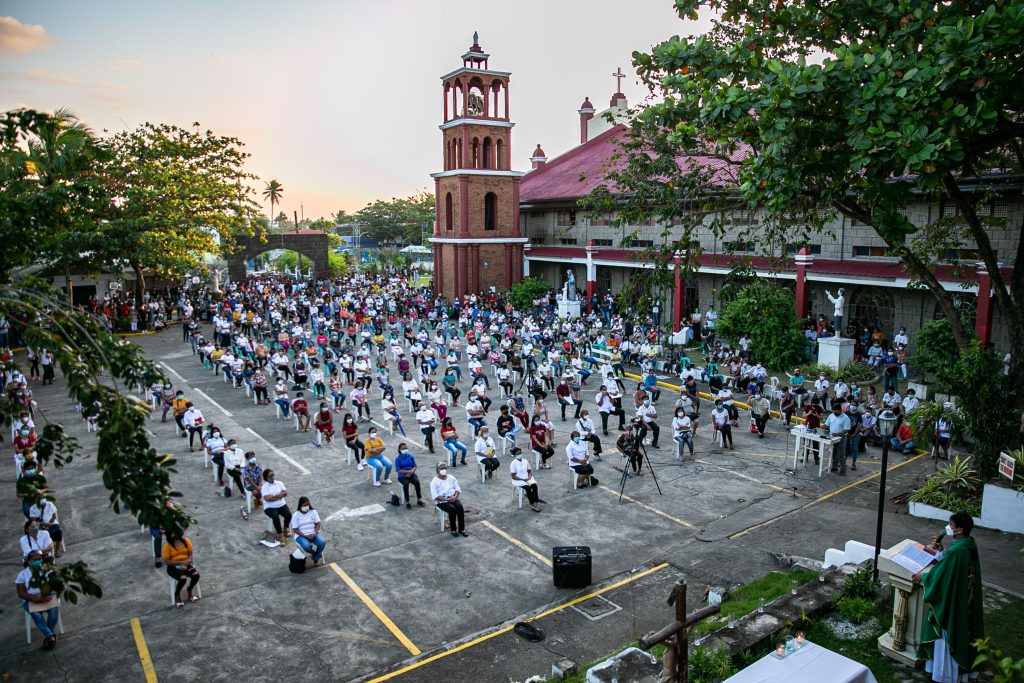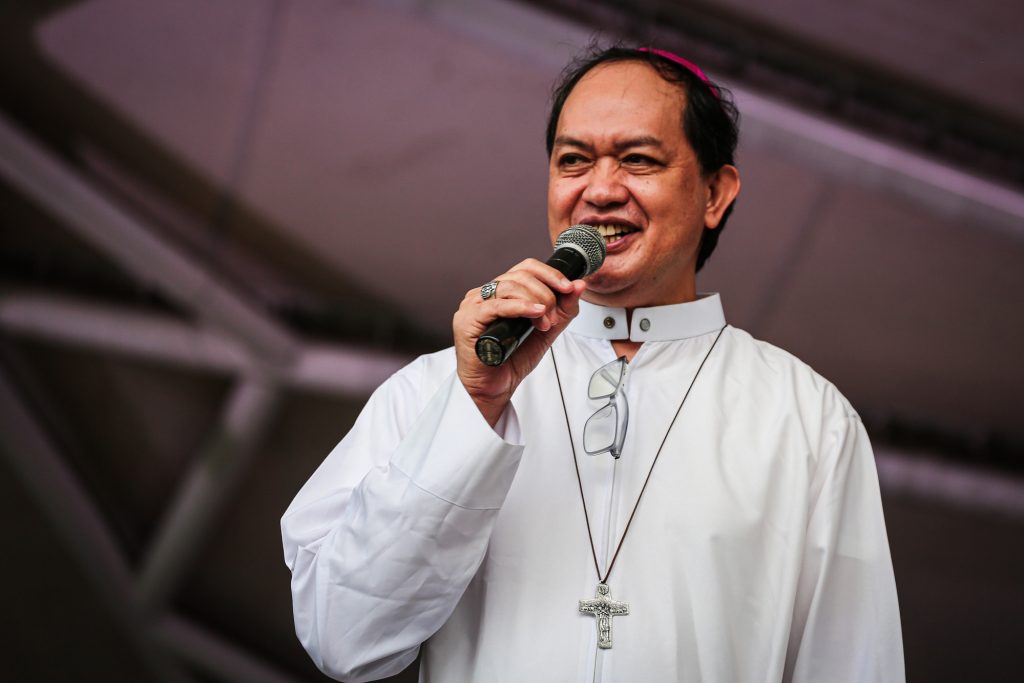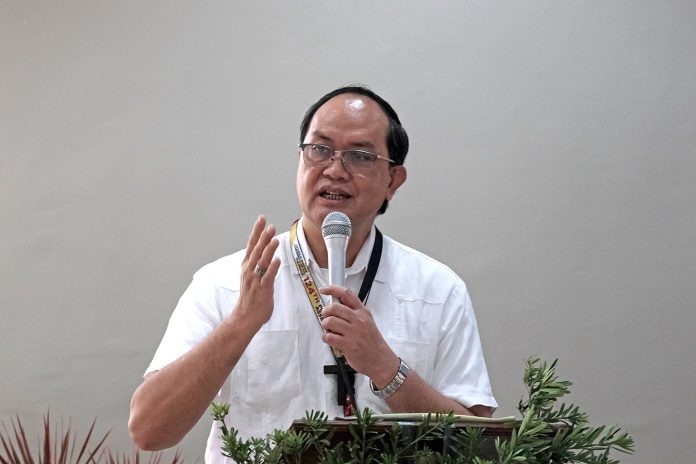Full text of CBCP President Bishop Pablo Virgilio David’s opening reflection for the
National Synodal Consultation at the Carmelite Missionaries Center of Spirituality in Tagaytay City on July 4, 2022.
In the next four days of this National Synodal Assembly, we will be reliving the experience of the earliest community of disciples in this literal UPPER ROOM of the Carmelite Missionaries’ Center of Spirituality in Tagaytay. Our goal is clear and simple—it is to respond to the invitation of the Pope Francis to grow into a more synodal Church, by learning to WALK WITH our Risen Lord on the way to the Kingdom of God.
Today we define ourselves in the words of the Spanish poet Antonio Machado as CAMINANTES, meaning, travelers. In his poem, Machado compares the poet to a traveler who sometimes loses the way—like those two disciples in the Emmaus story, who had left the upper room and had gone to another direction. Or like Thomas who, as the evangelist tells us, was NOT WITH THEM when the Risen Jesus appeared to the community of disciples.
Or sometimes, some of us can be like that traveler in the parable of the Good Samaritan, who, on the way from Jerusalem to Jericho had fallen victim to bandits and had been left on the roadside, badly bruised, helpless, and ignored by pious passers-by. The journey is interrupted and the traveler is no longer sure if he will reach his destination at all.
Antonio Machado says, “Caminante no hay camino, se hace camino al andar.” (Traveler, there are no roadways, you make the road as you travel along.) Sometimes, the journey feels like you’ve reached a crossroads and you feel uncertain which way to go. And there are times when we might feel like you’ve reached a dead-end, like the Israelites in flight, caught between the desert and the red sea, and there seems no exodus, no way out. Like a caminante who says, NO HAY MAS CAMINO.
Synodality is about daring to make a way where there seems to be none. Wasn’t that the call of the prophet John the Baptist? To PREPARE THE WAY OF THE LORD? Where there is no path, we make the path. It will call on us to do four things: every valley shall be filled in, every mountain shall be made low, every crooked way shall be made straight, and every rough way made smooth.
Synodality is not primarily about us walking with God but about God walking with us even when we stray, or even when are caught against a wall. He never abandons us. Rather, he seeks us as a good shepherd seeks his lost sheep. He walks with us often unrecognized, and does not leave us until he has redirected our feet to the right path—the path of the cross, the way of redemption, the way of unconditional love.
We recall the words of the prophet Micah 6:8, who said, “You have been told, O mortal, what is good, and what the LORD requires of you: Only to do justice and to love goodness, and to WALK HUMBLY WITH YOUR GOD.” To walk with God who humbled himself, who emptied himself to accompany us and lead us back to his Father.
The upper room is not really a pleasant picture. It is about the disciples getting stuck inside a comfort zone, unable to walk the path of the Master. It is an image of defensiveness—when we do not only close our doors but lock them up for fear. Fear is the natural reaction of those who have been wounded. It is what often prevents us from seeing the Lord present in our midst. It also blinds and hinders us from recognizing the Lord and walking in his path. These are three of the things that we will have to confront courageously as a local Philippine Church in this synod: our FEARS, our WOUNDS, and our BLINDERS.

Synodality is about the Risen Lord coming in our midst and inviting us to OPEN DOORS, the doors that have been kept locked by our fears, our wounds and our blinders. We have many of these; at our Metropolitan Assemblies we invited you to imagine them as the black veil covering the face of the Blessed Mother, waiting to be lifted up by an angel in order to facilitate an Easter Salubong experience.
You see, our Marian Salubong has its biblical basis, not in the Easter apparition stories, but in the Pentecost story of Luke, in the same Upper Room where the Holy Spirit descended on the community in the company of the Blessed Mother. Not only did they meet Christ at Pentecost. Through the gift of the Holy Spirit, they became the Corporate Christ. It was the gift of the Holy Spirit that made it possible for them to enter into that spiritual bond we call COMMUNION, which alone can make possible our PARTICIPATION in the life of the Church, the Body of Christ Christ, as a community of disciples IN MISSION to bring good news to those in the existential peripheries of this world, those who do not count in modern societies.
For John, the Holy Spirit is the gift of the Risen Christ, the gift that alone can transform our fears into peace and our griefs into joy. In the Spirit we are able to touch the wounds of the body of Christ and receive the power to work for mercy and justice, forgiveness and accountability.
Only the Spirit can blow away the blinders that prevent us from “BEING WITH” our fellow travelers. Luke tells us that it was not until the two disciples at Emmaus sat at table and broke bread with the Messiah incognito that their blinders fell off like scales and their eyes were opened to recognize him. Only after that could the Lord disappear, so that he could reappear in them and through them, the community of disciples whom he sends out on a mission.
Our method for this assembly is drawn from this Gospel text: LOOK, LISTEN & LOVE (a more evangelical way of saying SEE, JUDGE ACT). It makes you imagine children on the way to school and having to cross the life-threatening traffic in the busy highways of this world. Were we not told by our parents and teachers to take time, to STOP, LOOK, and LISTEN, before WALKING ON? Think of the WALKING ON as the LOVING.

And so here we are, we have stopped; we have paused from our regular activities and come here to Tagaytay. Throughout this synod, we will take time to LOOK closely and acknowledge our fears, our wounds and our blinders, to LISTEN attentively, to sort out the many discordant voices that we hear, and to discern those that lead us to peace, joy, and healing. We will identify the doors that need to be opened so that we can go forward together on the way, the way of Love, the way of Jesus, the way of the cross and resurrection.
We have embarked on this synodal journey in response to the invitation of Pope Francis, the one who carries for the Church the title of “Pontifex Maximus,” because his role is to remind us that we are called to take part in the life and mission of Christ, our greatest bridge-builder. Remember what Abraham had said to the rich man who never even so much as noticed the poor Lazarus by his doorstep during his lifetime? “Between you and us is a deep chasm that cannot be crossed by anyone.”
This synod has allowed us to name the many chasms or gaps that have kept us apart in the very unequal societies that we have built in this modern world. The good news is—the gaps that Abraham described as unbridgeable can now be crossed over by our greatest bridge-builder. For through his cross, through his passion and death, he has allowed himself to become “like a bridge over troubled waters.” He is the one who says “I will lay me down…so you can cross over.” That is another way of saying “I AM THE WAY, THE TRUTH, AND THE LIFE, NO ONE COMES TO THE FATHER EXCEPT THROUGH ME.”
This is how the Church, both local and universal, is invited to participate in the mission of our supreme bridge-builder.
We can only do this,
1. If we allow him to breathe on us the Holy Spirit so that he can dispel our fears, heal our wounds, and remove our blinders. Only then can we open locked doors and enter into COMMUNION with him and with one another.
2. If we allow the Spirit to empower us with his manifold gifts through which we can grow together into his body, the Church, through PARTICIPATION in the life of Christ.
3. If we allow the Spirit to renew the face of the earth by empowering us to carry on with the MISSION of Christ, to carry on with Christ’s work of redemption.









